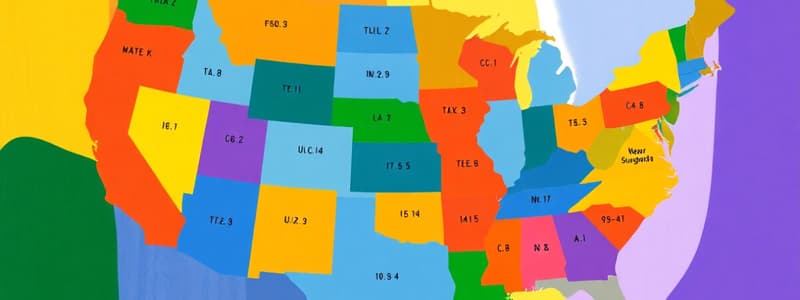Podcast
Questions and Answers
What is a significant factor contributing to discrepancies in educational quality across the US?
What is a significant factor contributing to discrepancies in educational quality across the US?
Which federal policy aimed to address educational achievement gaps?
Which federal policy aimed to address educational achievement gaps?
What ongoing issue affects minority students and those from low-income families in education?
What ongoing issue affects minority students and those from low-income families in education?
What challenge is faced by many areas in the education system?
What challenge is faced by many areas in the education system?
Signup and view all the answers
Which factor is a concern regarding the cost of education?
Which factor is a concern regarding the cost of education?
Signup and view all the answers
What is primarily responsible for funding public schools in the US?
What is primarily responsible for funding public schools in the US?
Signup and view all the answers
Which level of education comes after high school in the US education system?
Which level of education comes after high school in the US education system?
Signup and view all the answers
What factor can significantly influence the quality of learning environments in public schools?
What factor can significantly influence the quality of learning environments in public schools?
Signup and view all the answers
What are charter schools primarily known for?
What are charter schools primarily known for?
Signup and view all the answers
Which of the following types of degrees is typically a part of higher education in the US?
Which of the following types of degrees is typically a part of higher education in the US?
Signup and view all the answers
How do state governments influence K-12 education?
How do state governments influence K-12 education?
Signup and view all the answers
What often leads to disparities in educational resources across different regions?
What often leads to disparities in educational resources across different regions?
Signup and view all the answers
What aspect of higher education is crucial for societal mobility?
What aspect of higher education is crucial for societal mobility?
Signup and view all the answers
Study Notes
Overview of the US Education System
- The US education system is a complex and varied network of public and private schools, from preschool to higher education.
- It is decentralized, with significant autonomy given to individual states in setting curriculum, standards, and funding.
- This decentralization leads to considerable variation in educational opportunities across different states and communities.
- Public schools are funded primarily through local property taxes, which can impact the level of resources available to schools in different areas.
- The system is generally divided into preschool, elementary, middle, and high school levels, followed by higher education in colleges and universities.
K-12 Education
- K-12 education (Kindergarten through 12th grade) is primarily the responsibility of individual states.
- States create educational standards and often mandate specific subjects and skills that schools must teach.
- Curriculum and teaching methods can differ significantly from state to state.
- Standardized testing, such as state-mandated assessments, is used to gauge student progress and school performance.
- Varying school budgets affect resources available per student, which can influence the quality of learning environments.
- Charter schools and private schools also offer educational options, often focusing on particular pedagogies or serving specific needs, but often do not receive the same level of public funding as public schools.
Higher Education
- Higher education in the US includes colleges and universities.
- This often takes the form of four-year Bachelor's degree programs, though associate's degrees and other programs exist.
- Further education commonly leads to Master's, Doctorate, or professional degrees (e.g., law, medicine).
- Funding for higher education often involves a mix of tuition fees, government grants, student loans, and private scholarships.
- The cost of higher education varies widely among institutions.
- Post-secondary education is a crucial aspect of societal mobility, offering opportunities for professional advancement.
Funding and Resources
- Public school funding primarily comes from local property taxes, leading to disparities in funding across different regions.
- State and federal governments also provide funding but vary amounts significantly.
- Expenditures for educational resources commonly depend on factors such as state-level policies, funding levels, and local priorities.
- This often means differences in school facilities, technology, teacher salaries, and student support programs across various schools.
Educational Standards and Reform
- Standards for education vary significantly by state, creating inconsistencies in the quality of education across the country.
- Educational reform efforts frequently focus on improving teaching, addressing achievement gaps, and ensuring equal access to education.
- Ongoing debates regarding curriculum, testing, and teacher training constantly influence the structure and function of the US education system.
- The influence of federal policies, like No Child Left Behind and the Every Student Succeeds Act, on educational standards and practice is a factor.
Challenges and Concerns
- Funding disparities among schools often lead to differing levels of educational resources and opportunities.
- Inequity in access to high-quality education for minority students and students from low-income families remains a persistent concern.
- Achievement gaps between different demographic groups, such as ethnicity, socioeconomic status, and geographic location, emphasize the unevenness in educational opportunities.
- Teacher shortages and training challenges exist in many areas.
- The rising costs of higher education make acquiring higher education inaccessible for some students.
Studying That Suits You
Use AI to generate personalized quizzes and flashcards to suit your learning preferences.
Description
This quiz provides an in-depth look at the structure and functioning of the US education system. It covers the roles of public and private schools, the influence of state autonomy, and the impact of funding on educational opportunities. Test your knowledge on K-12 education and higher education in the United States.




